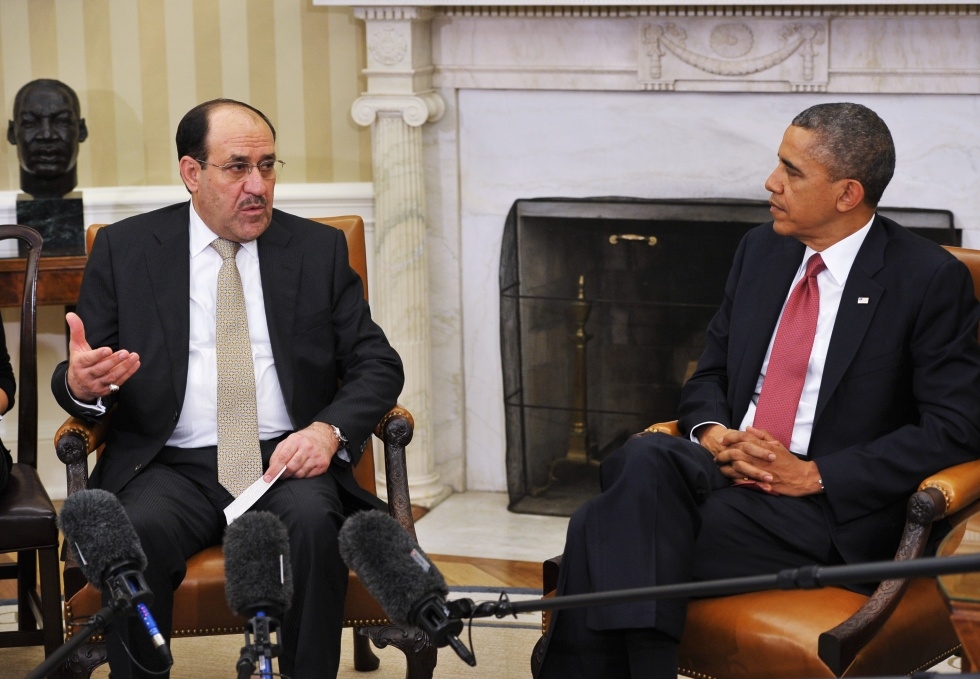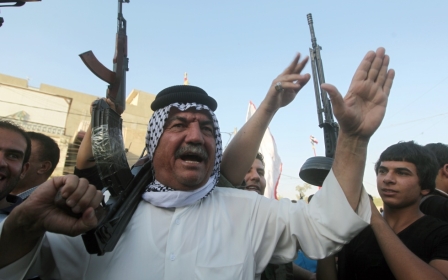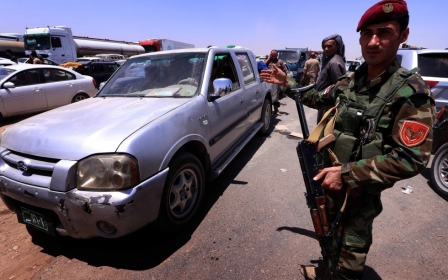Trade air strikes for Maliki stepping down

The Obama administration is faced with stark choices on how to respond to the current crisis in Iraq, which saw a Sunni militant organisation, the Islamic State of Iraq and the Levant (ISIL), seize control of vast swaths of Iraqi territory in a blitzkrieg-like operation over this past week.
Essentially, Obama has three options: The first is to send US troops back into Iraq. The second option is for the US to launch air strikes or use unmanned Predator drones to target ISIL units in order to slow their advance and allow Iraqi forces to regroup and counterattack. The final option is to simply do nothing and let Iraq deal with its self-generated problem on its own or allow Iran intervene directly.
Faced with the ISIL onslaught, President Obama, while emphasising that all options are on the table, has made clear that sending American troops back into Iraq to save the Shia-dominated government of Nuri al-Maliki is a nonstarter. On Friday, White House Press Secretary Jay Carney was emphatic when he said, “We are not contemplating ground troops. I want to be clear about that.”
In practical terms, the reintroduction of American troops into Iraq is a bad idea, even as a last ditch effort to save the Iraqi government. Much like during the Iraq War, the Americans would quickly become the target and it would almost certainly lead to a military quagmire. Obama is right—introducing US troops is a nonstarter.
A much more practical approach would be for the US to launch surgical air strikes—a mini shock-and-awe—against ISIL’s infrastructure, particularly the roaming columns of pickup trucks and US-made Humvees that have been key to its rapid success. Using satellites, intercepts and other intelligence assets, the US should have no problem identifying these groups and taking them out.
As with the Libya operation, the White House and Pentagon would need to take great care in selecting their targets, lest they end up hitting civilians, which would immediately undermine the operation. One potential problem, however, is that Obama may have to seek congressional approval for air strikes, although the intensive criticism from Republicans suggests this would not be a major obstacle.
The alternative to the introduction of troops or air strikes is for the United States to simply do nothing. As America’s strategic pivot to Asia gets underway, the President Obama has sought to disengage itself from Middle Eastern problems. Secretary of State John Kerry’s intensive shuttle diplomacy to bring about a settlement of the Israeli-Palestinian conflict is symptomatic of this shift. If the US can solve this conflict, it could properly refocus its energies in Asia, where China has clearly begun to flex its muscles. The same can be said of President Obama’s decision to not intervene in the Syrian Civil War last August. If the US intervened militarily in Syria it would become a target. Removing chemical weapons from the Syrian equation was the right thing to do.
Unfortunately, doing nothing comes at a pretty heft price. According to figures from the Council on Foreign Relations, between July 2013 and April 2014 nearly 50,000 more people have died in Syria. However, America’s stake in Iraq is a lot more significant than it ever has been in Syria, where it has never held much influence.
Another problem for the US is that if it does nothing to save Maliki, the Iranians certainly will. While there have been rumours that units from Iran’s Revolutionary Guard Corps (IRGC) have already entered Iraq, Iranian President Hassan Rouhani has denied this. He did, however, indicate that Iran is ready to assist the Iraqi government in its battle against extremist Sunni insurgents.
An Iranian intervention is not in America’s interests. While both the US and Iran have a vested interest in the Maliki government, neither wants to see the other secure greater influence in Iraq over the other. Given the tangle of competing interests in Iraq, the White House is right to be cautious about how it will proceed.
Meanwhile, the Republicans have mounted pressure on the Obama administration to “do something”. Representative Ed Royce of California, the chairman of the House Foreign Affairs Committee, told the New York Times, “We shouldn’t have boots on the ground, but we need to be hitting these columns of terrorists marching on Baghdad with drones now.”
Senator John McCain meanwhile accused President Obama of squandering America’s victory in the Iraq War: “The president wanted out [of Iraq] and now we are paying a heavy price.” He called on President Obama to fire his entire national security team, including Joint Chiefs of Staff Chairman General Martin Dempsey, and consult with Generals David Petraeus and Jack Keane - the architects of the 2007-2008 surge - on how to handle the crisis.
In reality, the problem with Iraq does not stem from Obama or his advisors, but with Iraqi Prime Minister Nuri al-Maliki.
By the time US forces left Iraq in December 2011, Maliki had consolidated unprecedented power in Iraq. A year earlier, Maliki, in an addition to being Prime Minister, took on the roles of acting Interior Minister, Defense Minister, and National Security Minister. These are the four most powerful positions of any country. It gave him unprecedented power over the police, military, security forces, intelligence services, basically everything except for the economy, oil and foreign affairs. Immediately after US forces withdrew from Iraq, Maliki order Iraq’s security forces to arrest his Sunni Deputy Prime Minister, Tariq al-Hashemi, on trumped up charges of terrorism. This would become a regular tactic employed to silence his critics. However, to calm concerns about his authoritarian tendencies, Maliki promised in February 2011 that he would not seek a third term. He lied.
According to Toby Dodge, a leading expert on Iraq and author of Iraq: From War to a New Authoritarianism, from 2010 onwards Maliki set out to break the electoral popularity of the main Iraqi opposition coalition, Iraqiyya. In a recent piece in the Guardian, Dodge explained, “In 2013 he drove the popular and effective Iraqiyya finance minister, Rafi al-Issawi, from the cabinet on trumped-up terrorism charges. This caused mass demonstrations across north-west Iraq, driven by a population who have come to see the post-2003 Iraqi state and its army as predatory, set on breaking them politically and marginalising them economically.”
Dodge is unbending in his criticism of Maliki. In a piece from 2012, Dodge warned, “Iraq today has a set of over-developed coercive institutions increasingly placed at the service of one man, its prime minister. The clear and present danger this poses to Iraq’s nascent democracy, its civil society and its population is obvious.” It is unfortunate that the Obama administration has been slow to listen.
Today, however, there are signs that Maliki’s stars are falling. Though Maliki’s State of Law coalition won the most seats in this April’s elections, the question of who will be the next prime minister has yet to be decided. According to Asharq Al-Awsat, even before the Mosul crisis, two rival Shi’a political blocs declared “their strong opposition to Iraqi Prime Minister Nuri Al-Maliki’s bid for a third term in office.” Similarly, his response to the ISIL offensives has been less than impressive. In the end, it seems clear that Maliki’s policies of intimidation and persecution are the real reason for this crisis.
So why should the United States intervene to save Maliki’s neck?
Speaking to the BBC, former Secretary of State Hillary Clinton said the White House should continue to reject Maliki’s request for airstrikes until he has demonstrated inclusiveness. “Maliki has to be willing to demonstrate unequivocally that he is a leader for all Iraqis, not for a sectarian slice of the country.”
The current situation in Iraq, in fact, gives the Obama administration considerable leverage. Maliki needs American assistance to fend off the ISIL/Sunni onslaught, but it is not in America or Iraq’s interests for him to continue on as Prime Minister.
There is no question that the US needs to “do something”, if only to prevent an Iranian intervention on Maliki’s behalf. However, this does not mean that an American intervention should be predicated on Maliki’s political survival, rather the opposite.
The Obama administration should exchange American air strikes for Maliki’s stepping down as prime minister and his temporary replacement by a compromise candidate - perhaps a Kurd - until Iraq’s parliament selects a new prime minister.
- Bryan Gibson is the Pinto Post-Doctoral Fellow at LSE IDEAS. He is a diplomatic historian, who completed his PhD thesis, entitled, ‘U.S. Foreign Policy, Iraq, and the Cold War, 1958-75’
The views expressed in this article belong to the author and do not necessarily reflect the editorial policy of Middle East Eye.
Photo Caption: Maliki meets with Obama in clamer times (AFP)
Stay informed with MEE's newsletters
Sign up to get the latest alerts, insights and analysis, starting with Turkey Unpacked
Middle East Eye delivers independent and unrivalled coverage and analysis of the Middle East, North Africa and beyond. To learn more about republishing this content and the associated fees, please fill out this form. More about MEE can be found here.





